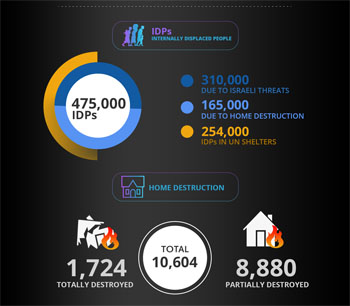Israel's culture of racism prior to the Shefa'amr massacre and the role of the Attorney General
On August 4, 2005, Eden Nathan-Zadeh, a newly-observant Jew who was serving in the IDF and lived in the settlement of Tapuach in the West Bank, murdered four Palestinian Arab citizens of Israel1 and injured twelve others in a cold-blooded attack. Nathan-Zadeh boarded an Egged bus from Haifa to Shefa'amr, and as it entered the city of Shefa'amr he opened fire on the passengers in an act of premeditated homicide (this event is hereinafter referred to as “the terror attack.”)
Prime Minister Ariel Sharon described the soldier (who will be referred to hereinafter as “the terrorist”) as “a bloodthirsty terrorist who sought to injure innocent Israeli citizens.” Testimonies collected by the Arab Association for Human Rights (HRA) from eye-witnesses to the terror attack indeed describe a despicable act of cold-blooded murder based solely on the desire to kill Arabs.
Government ministers, Members of Knesset and the Israeli media have argued that the terrorist sought to prevent the IDF withdrawal from the Gaza Strip (the Disengagement Plan) by murdering Arabs, and that this was the reason for the attack. The HRA believes that this observation, although correct, provides only a partial explanation for the terror attack. The terrorist was a settler from the Occupied Territories, and his decision to launch his attack against Palestinian citizens of Israel was no coincidence, but reflected a widespread belief among the Jewish majority that the Palestinian minority poses a security and demographic threat to the State of Israel. This perspective, which is deeply ingrained among the Jewish majority, formed the backdrop against which the terror attack was committed. The fact that the terrorist was a soldier in the IDF merely made it easier for him to carry out the attack and realize his intentions.
The HRA believes that an examination of the behavior and attitudes of the Jewish majority toward the Palestinian minority since the establishment of Israel, and particularly since the events of October 2000,2 leads to the conclusion that the terror attack did not take place in a vacuum, but was preceded by a long and ongoing process of overt racist incitement against this minority, both by the state and official authorities and by the Jewish majority. This incitement was reflected in diverse ways: Racist statements by Jewish public figures; the enactment of racist laws; demands for the Palestinian minority to be expelled from Israel or subjected to transfer; calls for Jewish communities to be cleansed from the presence of Arabs, and so on. These phenomena combined to create an overall atmosphere of racism that legitimized physical attacks on members of the minority, and the most extreme manifestation of this atmosphere was the cold-blooded murder of innocent citizens by a terrorist.
This report will show that the terror attack was a natural consequence of the policy of racist incitement directed against the Palestinian minority, and of the attempts to delegitimize this population. International human rights law and domestic Israeli criminal law both provide tools for combating racism. However, the attorney general, who heads the prosecution service and is responsible for the application of criminal law, has declined to exercise his authority to combat the widespread racism in Israeli society against the Palestinian minority. In adopting this position, the HRA believes that the attorney general has failed to meet his legal obligation, has contravened international and Israeli law, and has indirectly contributed to the tragic consequences.
This report is published some six weeks after the terror attack, and one week before the fifth anniversary of the events of October 2000, emphasizing that the HRA sees a direct line connecting these events. While the terror attack certainly stands out as a distinct and murderous incident, it cannot be divorced from the events of October 2000 and the changes that have occurred in the attitudes of the Jewish majority toward the Palestinian minority during the years that have followed. The attack constitutes one link in an ongoing chain of verbal and physical violence directed by the majority at the minority.
One week before the publication of this report, the Police Investigation Department (PID) of the Ministry of Justice published its report on the responsibility of police personnel for the killing of 12 Palestinian citizens and one resident of the Occupied Territories during the events of October 2000.3 According to the report, the PID has decided to close all the investigative files opened due to the behavior of police personnel during these events. The HRA believes that this decision, which is based on conclusions that are diametrically opposed to those reached by the Or Commission on this matter,4 confirms one of the conclusions of this report: that the State of Israel, through its various authorities, supports racist behavior and attitudes toward the Palestinian minority by the Jewish majority and thus legitimizes physical attacks.
Chapter Two of this report offers a brief review of the meaning of the term “racism” as this has developed over the years. Chapter Three discusses the tools provided by international human rights law in combating racism. Chapter Four reviews the development of criminal law in Israel on this subject and the tools provided for combating racism. Chapter Five discusses the different manifestations of racism against the Palestinian minority in recent years in various fields. Chapter Six examines the policy of the Attorney General and his reaction to racist statements against the Palestinian minority made by Jewish public figures in recent years. Chapter Seven summarizes the conclusions derived from the previous chapters. Appendix A provides a detailed description of the terror attack, including the testimonies of eye-witnesses. Appendix B describes examples of cases in which Palestinian citizens have been attacked by Jewish citizens. Appendix C provides the text of the Israeli criminal code relating to the struggle against racism.
To View the Full Report as PDF (572 KB)





